This week's best things
From change fitness and polytunity, to Edinburgh’s innovation role and why councils should share more. Plus: taste as intelligence, AI tutors, immersive art takedowns, a reminder to join the new digital culture community, and System of a Down cover bands.

Hello from Gothenburg where the weather this week has been wonderful.
The light has had that golden, summer-into-autumn feel and the leaves on the trees in my local bit of forest have started to turn. I love this time of year.
Ok, here are some good things, mostly spotted via clever friends this week.
Organizations Need To Shift From Change Management To Change Fitness
Spotted via my clever friend Chiara was this piece on 'change fitness'.
"Walk into any organization today and you'll hear a familiar refrain: "Once we get through this reorganization..." or "After this system implementation..." or "When things settle down..." The uncomfortable truth is that things aren't going to settle down and we can’t always predict the next big change around the corner. This truth is so palpable that many feel the VUCA framework — Volatile, Uncertain, Complex and Ambiguous — is no longer sufficient to describe the times we live in, opting instead for futurist Jamai Cascio’s concept of BANI – Brittle, Anxious, Non-linear, Incomprehensible.
Today’s perpetual state of flux creates not just physical tiredness from working long hours, it's a deeper, more insidious form of depletion. Teams are experiencing what Harvard psychologist Robert Kegan might term "cognitive overload," where the complexity of their environment consistently exceeds their current capacity to make sense of it. The result? A workforce that's not just tired, but fundamentally unable to engage with change in productive ways."

What This Year’s Edinburgh Festival Tell us About Innovation in Scotland
A good piece from my pal Nick Sherrard on the nature of (performing arts) innovation in Scotland.
"Scotland imagines that simply by hosting the biggest arts festivals in the world it will reap the economic rewards of what Dan Breznitz in his book Innovation in Real Places calls a stage one economy, where new-to-the-world inventions are created. Almost as if Adam Smith’s guiding hand will look after the rest.
All over the world, though, we find that unless the local ingredients are right, stage one innovation rarely leads to innovation-led prosperity. The classic example of it working is Silicon Valley, which has highly unusual ingredients in its soil that are not easily simulated.
The reality is that the Edinburgh festivals in effect make Scotland what Dan calls a stage four creative ecosystem. Work is assembled here – international shows, international promoters, international bookers. It isn’t invented here, though."

Polytunity
Spotted via the always curious Imran Ali, a piece from Yuen Yuen Ang on reframing The Polycrisis.
"Polycrisis is a descriptor that the establishment can agree on without challenging itself. It abstracts the causes of crises, making them appear as natural convergences rather than the systemic outcomes of extractive and exclusionary orders. And it makes the concept appear global when in fact the voices, experiences, and priorities it reflects are overwhelmingly Eurocentric.
The virality of polycrisis reveals something deeper: the enduring power of elite discourse. Even though the term is empty, its followers amplify it—and the echo reinforces paralysis. If leaders remain content with only naming fear, they will consign themselves to irrelevance.
I see things differently. I call this moment a polytunity—a term I coined in 2024 to reframe disruption not as paralysis but as a once-in-a-generation opportunity for deep transformation.1 Transformation not only of our institutions, but of our ideas, our paradigm, and the way we think."

Where can councils start sharing effectively?
I wrote a thing about shared infrastructure recently.
Earlier this week I was pointed towards this piece from Dave Briggs (this is the cue for my weekly thanks shoutout to Neil), the parallels with the culture sector are...significant.
"many of the oft-cited root causes of digital incompetence actually have a root cause themselves - capacity. Have hundreds of councils trying to do the same thing, over and over again, is nuts"
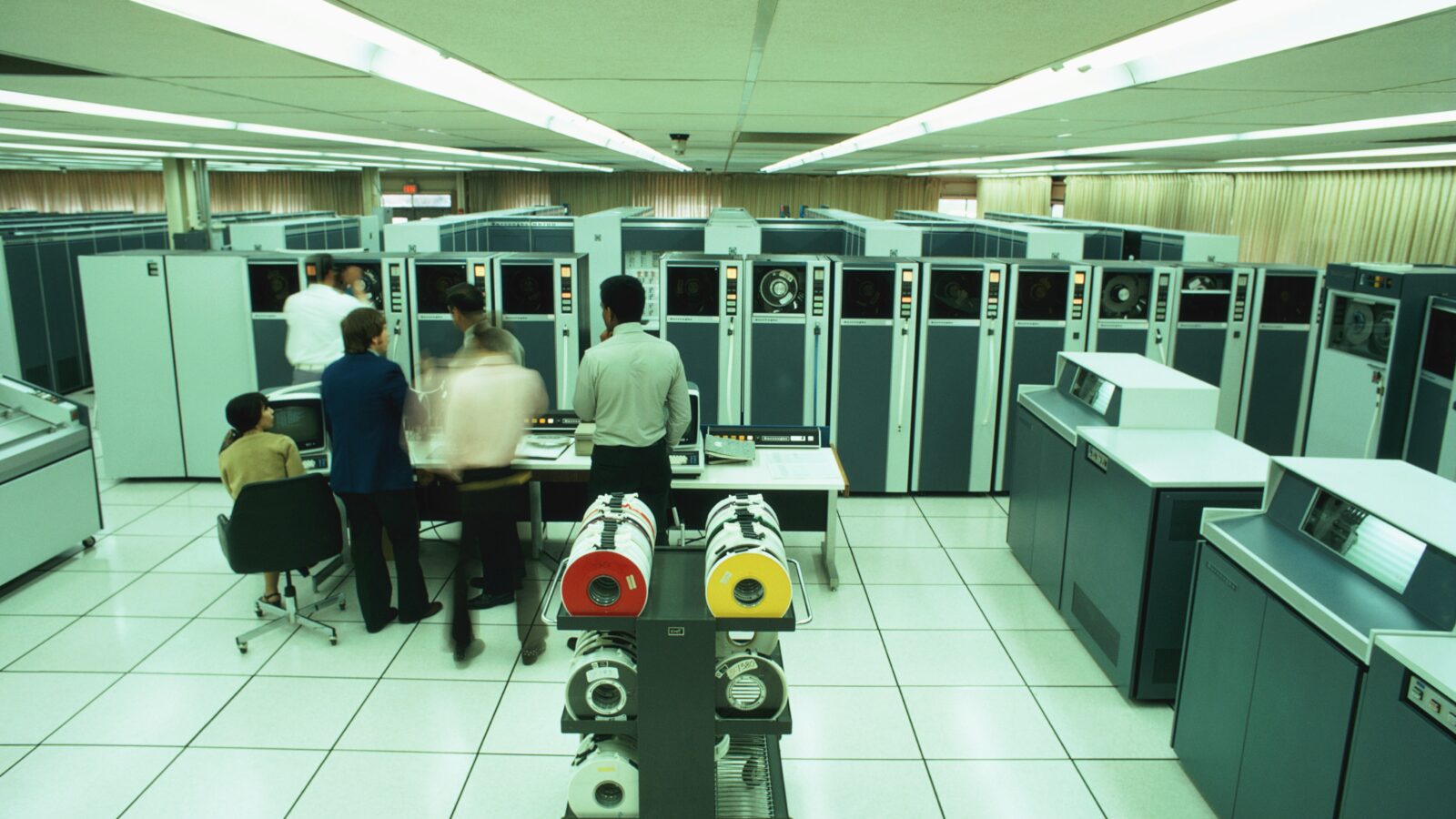
Join the community
Why not join the new pilot community space I've set up for people doing digital work in the cultural sector.
It's all free for now - I'm covering all the costs until the end of the year, and if it seems like it's worth continuing by the end of the year then paid tiers will launch in January 2026.
- Individual for freelancers/independents and people joining in a personal capacity
- Organisation for people working inside cultural organisations (museums, theatres, galleries, festivals, etc.)
- Supplier for people working at agencies, studios, platforms, or product/service suppliers to the sector
Immersive Art Exhibitions Are Everywhere and They’re Awful
I hadn't read a Vice article for a long time until this popped up in my feed. Interesting (?) to see the house style is still intact and as grating as ever, although I think the piece makes a number of decent points (that admittedly have probably been made in a less annoying way elsewhere).
Many of these are pretty clear examples of situations where there was apparently never any actual thought about why something actually needed to happen in a certain way (beyond perhaps 'short term money' and 'because everyone else is doing it').
"At best it’s unimaginative. Paying a boiler room of animation undergrads to make the stars move in Van Gogh’s Starry Night isn’t an act of supreme creative genius, it’s distracting. And when this same effect is applied indiscriminately to the rest of his canon (and some clichéd asylum scenes), it becomes quite hard not to laugh. At moments, I felt like I was trapped in a GCSE art student’s idea of a bad trip. Leaving the exhibition I wasn’t sure what Van Gogh himself would’ve thought, but I fear that if he too had shelled out £25 for a ticket, he’d be inclined to mutilate more of his remaining sensory organs."
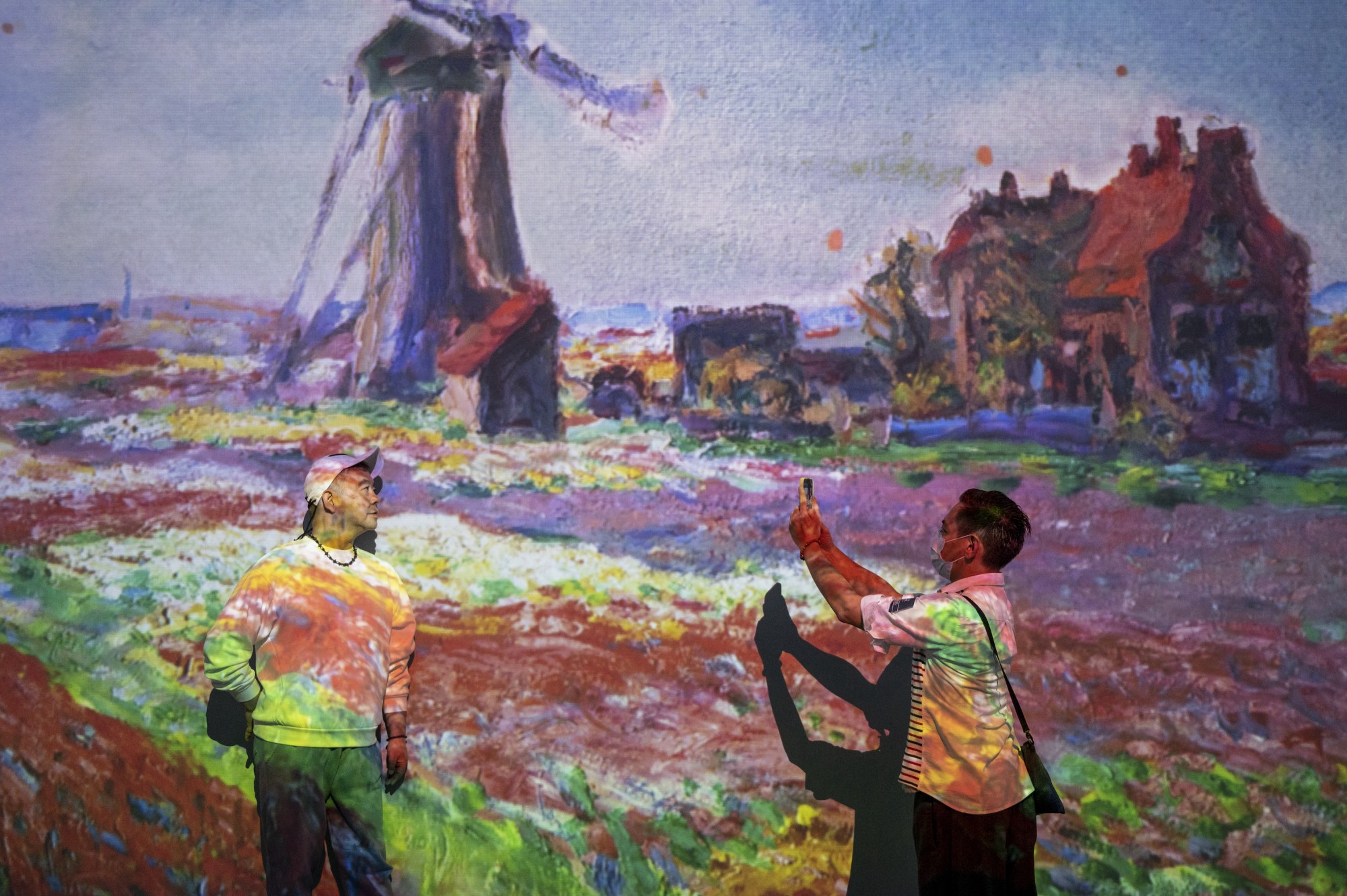
Not making it 'safe to fail', but 'safe to learn'
The very smart and pragmatic, Dr Carrie Goucher shared a useful reframing this week.
"Over the last 20 years, there is ONE cultural shift that orgs have asked for my help with. It's this:"We want to make it safe to fail"
The thing is... no one wants to fail more than they already do and failure is not a goal!
And anyway, most people find it is most certainly 𝘯𝘰𝘵 safe to fail, despite what leaders say "
Carrie suggests instead focusing on learning, "because that's the point of failing". In this video she suggests 3 really practical changes that could help.
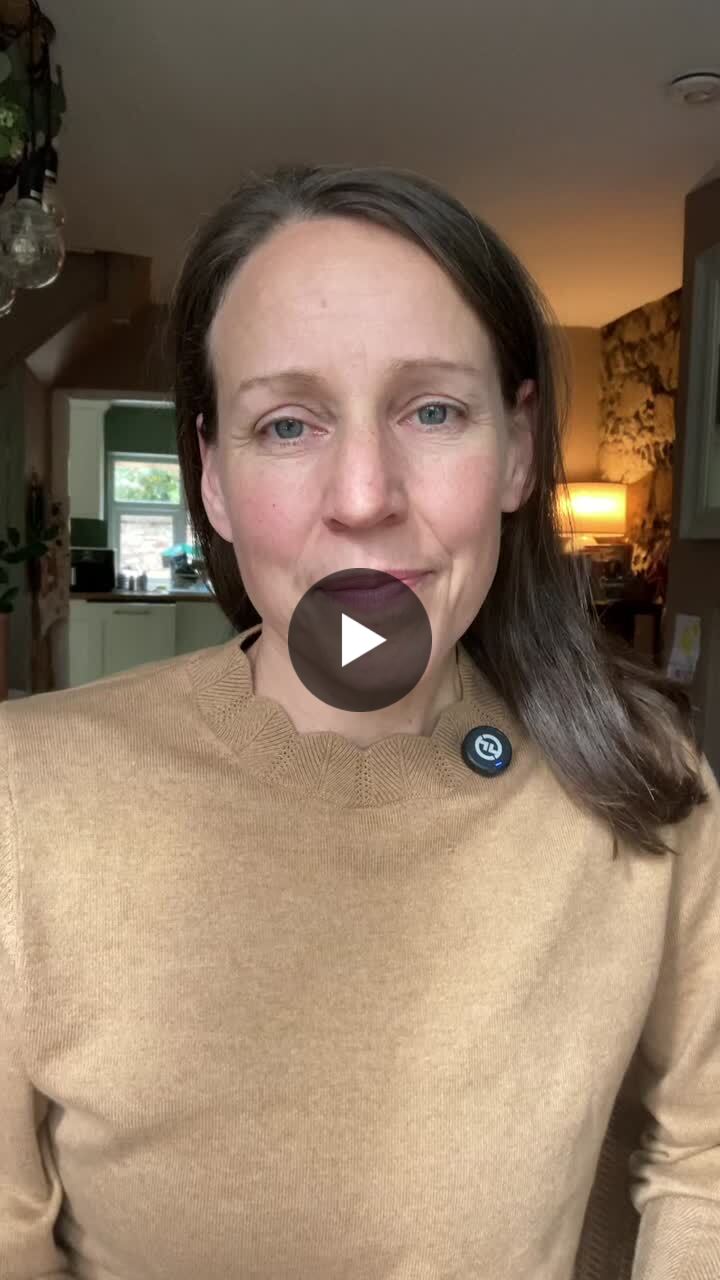
Taste is the new intelligence
An interesting piece from Stepfanie Tyler on the value of choosing (which echoes some of the findings of some research that the folks at Storythings did a few years ago).
"We’re drowning in content.
Every platform, every scroll, every second—more inputs, more noise, more things trying to hook your attention. The old metrics of intelligence—who memorized the most, who spoke the loudest, who finished the book first—don’t mean much here.
In an age where AI can generate anything, the question is no longer "can it be made?" but "is it worth making?" The frontier isn’t volume—it’s discernment. And in that shift, taste has become a survival skill.
Not taste in the superficial sense—not trend-chasing, not aesthetic mimicry, not expensive minimalism for the sake of status. Real taste. The kind that signals coherence. Clarity. The ability to choose what matters in a world drowning in what doesn’t."
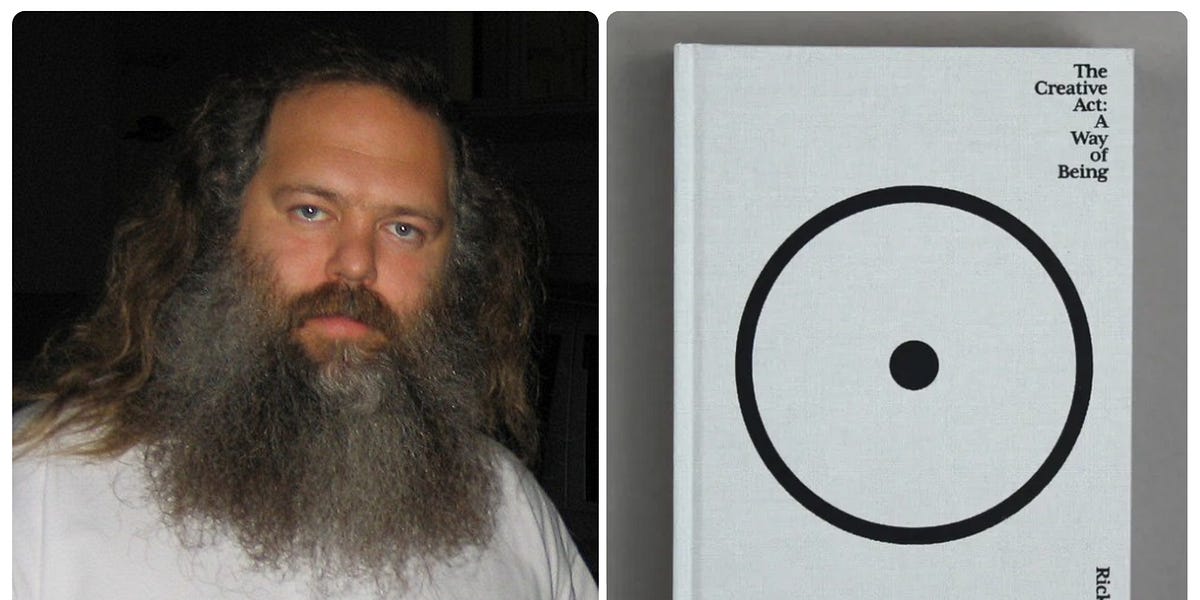
London Museum rebrand
You lot seem to like a rebrand so here's the story of the London Museum pigeon poop.
Abysmal or perfect
This is a nice visualisation of how 'good' or 'bad' people perceive the meanings of different words. It's also useful if you do any copywriting.
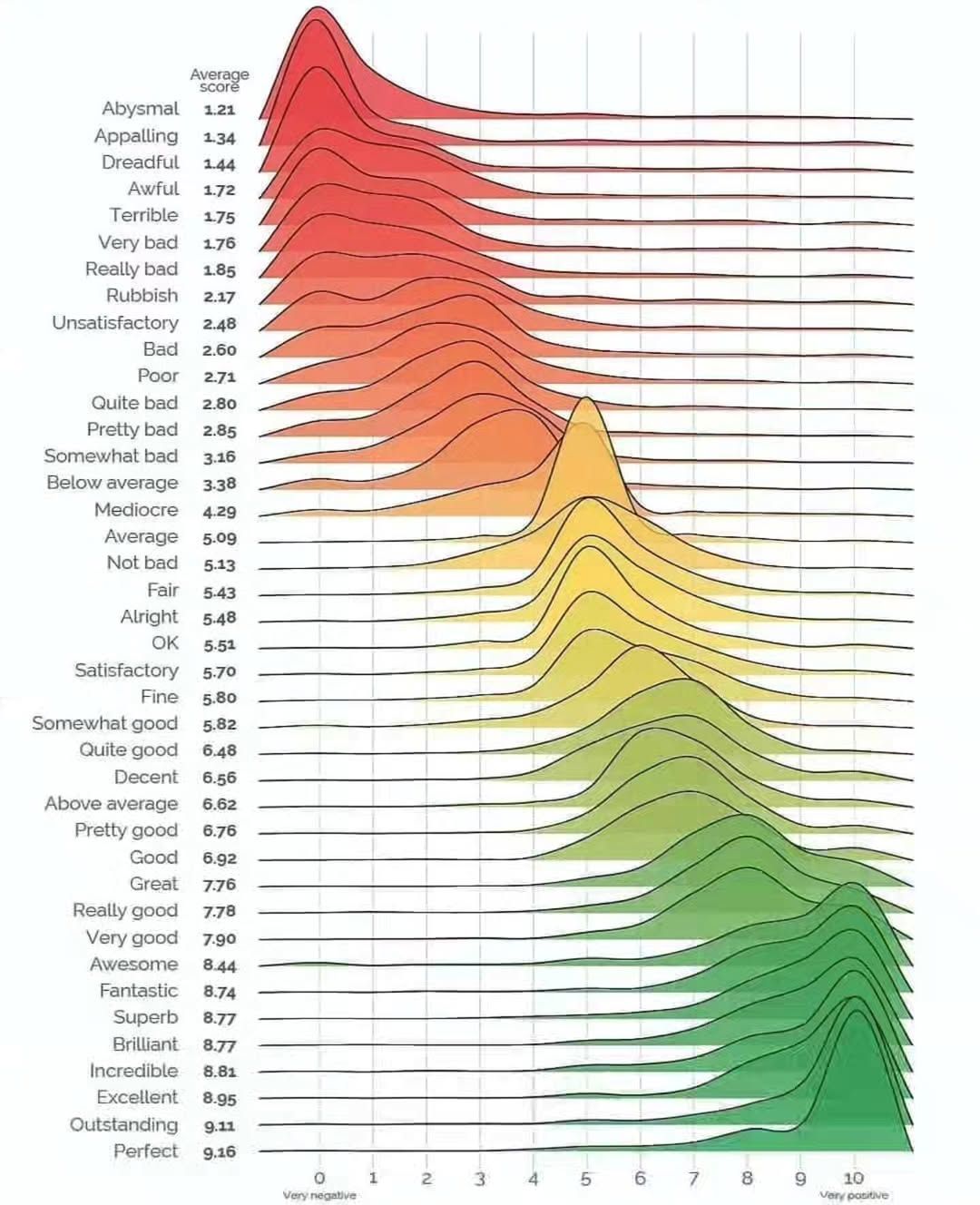
I got an AI to impersonate me and teach me my own course – here’s what I learned about the future of education
It's interesting to see some of the ways in which people are using AI tools to do reflection exercises that would otherwise be difficult or impossible to achieve.
"Imagine you had an unlimited budget for individual tutors offering hyper-personalised courses that maximised learners’ productivity and skills development. This summer I previewed this idea – with a ridiculous and solipsistic test.
I asked an AI tutor agent to play the role of me, an Oxford lecturer on media and AI, and teach me a personal master’s course, based entirely on my own work.
I set up the agent via an off-the-shelf ChatGPT tool hosted on the Azure-based Nebula One platform, with a prompt to research and impersonate me, then build personalised material based on what I already think. I didn’t tell the large language model (LLM) what to read or do anything else to enhance its capabilities, such as giving it access to learning materials that aren’t publicly available online.
The agent’s course in media and AI was well structured – a term-long, original six-module journey into my own collected works that I had never devised, but admit I would have liked to.
It was interactive and rapid-fire, demanding mental acuity via regular switches in formats. It was intellectually challenging, like good Oxford tutorials should be. The agent taught with rigour, giving instant responses to anything I asked. It had a powerful understanding of the fast-evolving landscape of AI and media through the same lens as me, but had done more homework."

Making the most of solutions, rather than problems
Some of the work I'm doing a the moment is helping organisations to test hypotheses, or explore what might need to be true for a desired future state to be possible.
In this context I came across this helpful post from product coach, Ant Murphy.
"We ask questions like: "What problem are you trying to solve?"
But for some this is a stretch.
We hit a wall, there's resistance.
The Stakeholder can't understand why they need to give a problem, when they have this amazing solution idea (after all it's an awesome idea, right?)
So instead of trying to work against their thinking, go with it.
In these situations I've had a lot of success looking forward, not backwards.
Rather ask:"If we did deliver this solution, what changes as a result?"
"What does it mean for us? the org? our users?"
"What can they now do that they couldn't before?"
Rather than trying to get them to articulate the problem, get them to think about what would be true if we did deliver their solution."
As Ant says, shifting the focus to embrace ideas and properly explore what they are imagining could be achieved, why that's a good idea, and might need to happen in order for any of it to be possible can be a quick and productive way of being able to talk honestly about things like assumptions, needs, and prototyping.
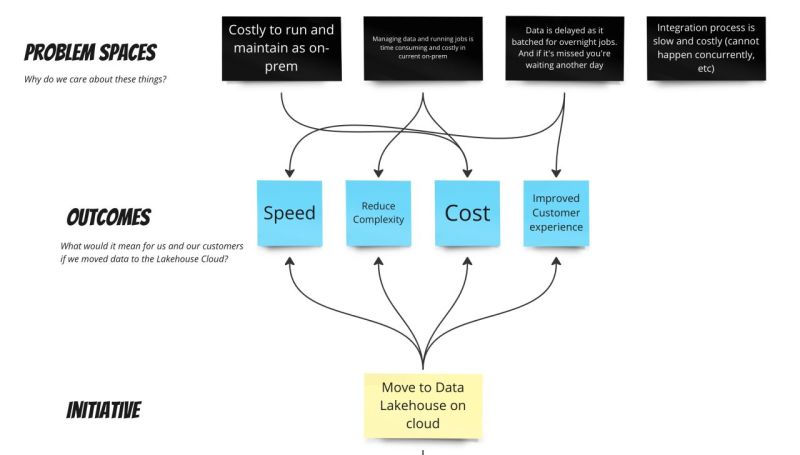
Systems of a Down(s)
As someone who used to play System of a Down covers when he was a teenager in a band, hearing about Daron Malakian (System of a Down's singer/guitarist) stumbling across a SOAD cover band performing in a bar in Chicago and then joining them for a song, was a nice thing to read about (and watch) this week.
For all fans of Armenian metal.
Last week's best things
The 3 most popular links in last week's edition:
- Content Design London's article "Managing backlogs of web content: where to start"
- One Further's report on "The impact of AI Overviews in the cultural sector"
- And Lauren Pope's work on organising structures for content teams.
This week's consumption
We went to see Materialists which was...ok, it felt like it couldn't quite work out what it wanted to be.
This week's vinyl included Christopher Tin's The Drop That Contained the Sea and Leonard Cohen's You Want it Darker.
I also watched Wild (the adaptation of the Cheryl Strayed memoir) and Wild Life (a documentary about Kris Tompkins - the former CEO of Patagonia, and her husband Doug Tompkins - the founder of North Face). Plus Only Murders in the Building is back.
See you next week
Thanks for reading all the way to the end, please enjoy this genius/terrible suggestion for volume settings.
To finish, a quick reminder that I'm a consultant who helps cultural organisations do better digital work.
Here are some workshops I offer.
I'm also currently working with organisations on things involving:
- user research to inform digital investment priorities,
- technical strategy,
- leadership development,
- 'critical friend' advice,
- project governance,
- mentoring,
- digital strategy,
- and digital readiness.
If it sounds like I could be useful, then let's chat.









